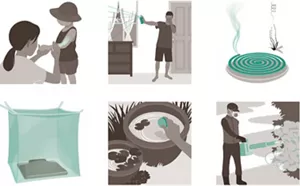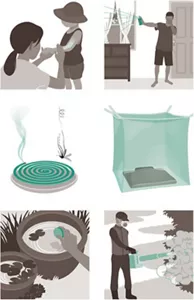Basic Information on Dengue Fever
Prevention and Countermeasures for Dengue Fever
WHO’s view of dengue fever [1] is that although it has spread rapidly over large areas in recent years, a safe and effective vaccine has not yet been developed for dengue fever [2]. To prevent dengue infection, it is important to avoid being bitten by mosquitoes that carry the virus.
Mosquito countermeasures
To prevent mosquito bites, it is effective to use countermeasure products (e.g., repellents, insecticides, mosquito coils, mosquito nets, screen doors), and to minimize skin exposure using long sleeved clothes. Although pesticides and repellents have been shown to have sufficient repellent effects in efficacy tests, in areas with high rates of dengue infections, not only the effect but also the ease of use of such products daily without burden is important [3].
In Southeast Asia, the habitat of mosquitoes infiltrate the living environment of humans, and it has been reported that 43% of Aedes aegypti was captured indoors (bathroom, kitchen) in a field survey in Indonesia to investigate the number of Aedes aegypti indoors and outdoors [4]. Therefore, indoor mosquito control is important in Southeast Asia.
It is also important to create an environment that eliminates puddles and tubs around the house that allow mosquitoes to spawn outdoors. In some cases, larvicide is used in water tanks to prevent mosquito outbreaks.



Community measures
A meta-analysis evaluation of dengue fever control showed that efforts, such as reducing spawning grounds and using larvicide throughout the community are very effective [5]. It is important to understand the ecology of mosquitoes and maintain an environment where dengue fever is unlikely to occur.
Additionally, mosquito-borne infectious diseases, such as dengue fever spread again when the infected person is bitten again by a mosquito. Therefore, when an infected person is diagnosed, it is necessary to prevent the transmission by mosquitoes from spreading to the surrounding area. Insecticide spraying in the areas with dengue fever by the health insurance bureau is common.
Refernce:
-
[1]WHO fact sheets/Detail/Dengue and severe dengue, https://www.who.int/news-room/fact-sheets/detail/dengue-and-severe-dengue
-
[2]Dengue vaccine: WHO position paper, September 2018 - Recommendations, Vaccine 37(35): 4848-4849, 2019
-
[3]Factors influencing the use of topical repellents: implications for the effectiveness of malaria elimination strategies, Scientific Reports | 5:16847
-
[4]Proc ASEAN Congr Trop Med Parasitol. 2008;3:116-20.
-
[5]PLOS Neglected Tropical Diseases | DOI:10.1371/journal.pntd.0004551 March 17, 2016
- Home
- Innovation
- Research & Development
- Infectious Disease Control Study Dengue Virus Mosquito Research
- Basic Information on Dengue Fever
- Prevention and Countermeasures for Dengue Fever
- Home
- Innovation
- Research & Development
- Infectious Disease Control Study Dengue Virus Mosquito Research
- Basic Information on Dengue Fever
- Prevention and Countermeasures for Dengue Fever
